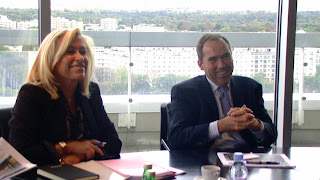

“We will not invest on the rail tracks; it is the government’s job” –Gilles Alix, CEO of BOLLORE
The CEO of the Bollore Group was speaking on Tuesday October 13 to a host of African economic reporters at the company’s head office in Paris.
The CEO of the Bollore Group, that runs the Cameroon Railway, CAMRAIL, announced on Tuesday October 13 in the Group’s head office in Paris, that they cannot develop the rail track, adding that it is the job of the government. “They want us to develop the entire rail track. This is not possible, this is not possible, it is too heavy. We would like to buy locomotives, buy wagons and somewhat improve the transportation of goods, but we cannot take the responsibility of developing the rail track.” Gilles Alix said, affirming what is more or less common knowledge in Cameroon that the French magnate is uninterested in transporting passengers, and will rather run only commercial trains “Passengers is another issue, it is complex and it is dangerous. That is not why we signed the contract, you must understand it is not our cup of tea; we are first of all logisticians. We were obliged in the contract requirements to agree to this, and we now see this is dangerous.
On Monday October 19, another fuel-carrying train derailed at the entrance of the Yaounde Railway Station, the third in as many months. On September 28 and 29, a succession of train derailments, in Yaounde that killed 9, brought to light the ageing state of the Cameroonian railway. Investigations are still underway as to the exact causes of the September derailments, however, inside sources at CAMRAIL acknowledge that “the rail tracks and locomotives are obsolete, and the string of derailments has been regular in the past six months”.
The Group across its subsidiary Bollore Africa Logistics, which also operates the container terminal at the Douala seaport, took control of the railway company REGIFERCAM in 1999, to better dispatch its imports inland. Even if its CEO claims railways in Africa are difficult to manage “We realized it’s a business where we don’t earn a living, and in which we re-invest more than we make.”
Gilles Alix also noted that the group that also runs SITARAIL, the rail link between Cote d’Ivoire and Burkina Faso, has suggested to African governments and the World Bank to develop communications infrastructure on the continent and not expect investors to do so.
Curiously the French business magnate managed to renew and renegotiate its contracts with the governments of Cote D’Ivoire, Burkina Faso and Cameroon over the last 3 years.
Bollore, Africa’s Privileged Logistics Partner?
The group created in 1822, ranks amongst the top 500 world businesses, one of the best implanted on the African continent, and has what it calls its ‘Africa creed’, “We were amongst the first to show faith in Africa, we were amongst the first to invest, and we continue to believe in Africa” says Gilles Alix, adding that “we make a lot of money in Africa”.
With 200 agencies and close to 20.000 employees in 41 countries and a turnover of 1.7 billion Euros, the Group which has been operating in Africa for more than fifty years is a key player in the continent’s economic and social development. It has also drawn close to most African governments, attracting what its CEO calls jealousy.
Speaking about this privileged business ties with some African governments Gilles Alix said “We have stronger business ties with French-speaking African countries, but I must say English- speaking Africa has a new generation of businessmen, that makes doing business easier, without the influence of governments. In francophone countries, it’s much more complex.”
“We have been around for long, and we have built friendly ties with some political figures (…) It is not to do business that we do this, it is to make sure that the we do business in good conditions, we are not asking for privileges, and that we are treated correctly in fiscal matters.”











